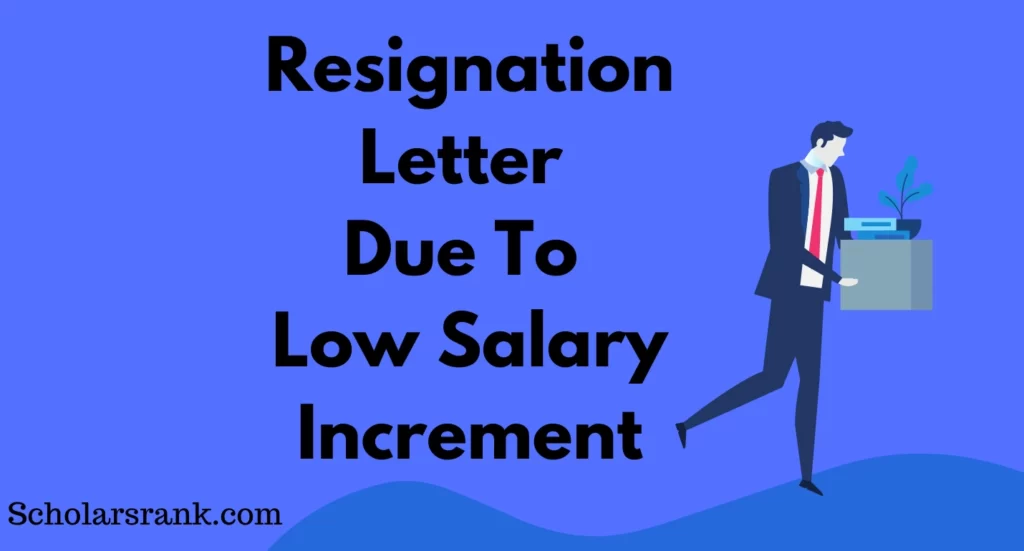When leaving a job due to low pay, tendering a polite resignation letter due to low salary increment will help you keep your professional contacts, quitting your current position can be as a result of a wide range of reasons. People may quit their jobs because of the perception that their salary is insufficient to cover basic costs or advance their household budget. In this post, we present a template and an example to assist you in writing a resignation letter due to low salary.
It is typically crucial to have cordial contact with your former employer after tendering your resignation. This is due to the possibility that you may require a solid recommendation and references for a new position or that you may ultimately collaborate with your former coworkers once more but in a different capacity.
Whatever your reasons for leaving, writing a resignation letter may be an excellent way to keep positive ties with your previous company and expand your network. Writing a letter of resignation when you’re leaving because of a low salary may also help you emphasize the best parts of your time there, maintaining the proper professional ties in your field.
How To Write Resignation Letter Due To Low Salary Increment
It is possible to write a well-acceptable resignation letter due to low salary increment by adhering to stringent guidelines and conventions. I have included the eight stages below that go into creating the greatest resignation letter due to low salary.
- Highlight Your Reasons
Make sure your reasons for leaving are crystal apparent before you start composing your letter of resignation. Make sure you have determined your ideal base pay and the factors that led you to that decision in the event of a low salary. You may decide whether to include this knowledge in your letter or use it to make sure your choice process has been thoroughly thought out.
- Be Conscious of Your Tone
Next, consider the tone you want to use in your resignation letter. Consider coming up with a concise, straightforward tone that exudes confidence. To ensure that your reader can comprehend your purpose without thinking you are rude, utilize formal language with a respectful tone.
- Begin with Respectful Greetings
Use formal language to introduce your letter. Well-mannered language can help you make a good impression of your professionalism, even when you are resigning from your job. Good introductory phrases can include “Dear [Recipient Name],” “[To Whom It May Concern” (this is used if you do not know the possible recipient of your letter), or simply “Greetings.”
- Highlight Your Intentions
This step involves making it crystal clear in your resignation letter that you are quitting your job. Include the day you want to leave the firm. Before giving any corroborating evidence, it’s crucial to state your objective in your resignation letter. This is done to make sure your audience comprehends your goals, which will set the stage for any further service you choose to offer.
- Give Your Summary
Willfully, you may list your exit strategies. If this is the case in your scenario, expressing that you are looking for more pay might help to make it clear that there are components of the job that you enjoy. Additionally to the poor salary, you might also list any other factors that contributed to your decision to tender your resignation letter.
- Provide Other Extras if Available
If it makes sense for your circumstance, you can provide a more thorough justification for each of the reasons you’re leaving after summarizing them. This is helpful if your reasons for leaving are connected.
- Send Appreciations to Your Supervisor
Thanking your supervisor for the benefits of the job you are leaving, such as the chance to learn and develop relationships with wonderful coworkers, is a fantastic approach to accomplish this. This may be especially the case if your reasons for quitting your employment contained fewer complimentary remarks.
- Willfully Offer Transitioning Help
Think about proposing to assist your company in finding someone to take over your position whenever you leave. This comes as a way to keep solid professional ties after leaving your present position.
Resignation Letter Due To Low Salary Increment Template
TEMPLATE 1
[Employee’s name]
[Your position]
[Company]
[Date]
To:
[Employer’s name]
[Role]
[Company’s name]
Dear [Employer’s name],
I am writing to let you know that, effective from [prospective last date at work], I will leave my position as the [Job title].
[Highlight your reasons for leaving, conveying to your superiors if you like the idea of greater pay.] Thank you for [outline the part of the job you have enjoyed and value].
I would be glad to assist with [highlight your willful offering of helping the potential replacement with th4 transition process or transfer of the company’s resources.]
Please accept my heartfelt gratitude for [highlight what value has been added to your career over your working time at the company]. I am looking forward to [tell the recipient how you hope to remain in connection with the company and maintain a good tie].
Yours Sincerely,
[Your Signature]
TEMPLATE 2
[Employee’s name]
[Your position]
[Company]
[Date]
To:
[Employer’s name]
[Role]
[Company’s name]
Dear [Employer’s name],
I hereby write to inform you of my decision to resign my [your designation] at [Company Name]
I have been a wonderful worker in your firm and I have had fruitful moments but due to the recent development that led to salary reduction (state when this happened), I am sharing the intentions of my inability to continue to offer my services for the company. (Highlight your reason and situation).
After years of working with the firm, there has not been any significant increase in my salary. This has consequently affected my finances and I have been unable to meet up my financial obligations. (Explain current financial problems). I, therefore, honorably tender my resignation and hope for your favorable response in honoring my request to enable me to look for a better offer elsewhere.
Yours Sincerely,
[Your signature]
Conclusion
Whatever the case, you should not rudely state in your resignation letter that your reasons for leaving are outrightly because of low salary. This could sound disrespectful and affect your ties and relationship with the company.
My standard rule, in my opinion, is to always leave and resign on a good note without burning bridges. This is because cutting off your chances of returning in the future is not always the best way to go. Apart from that, recommendations and references from your previous work places could prove to be the game changer in your career. In essence, be polite and formal when writing your resignation letter due to low salary.
You can also read on Writing a Resignation Letter Due Bad Work Environment.








